The Legend of the Wooden Horse, or the Trojan Horse, is one of ancient Greece's most captivating stories. This tale, passed down from generation to generation, tells of a cunning plan crafted by the Greeks to finally infiltrate the city of Troy after ten long years of grueling warfare. It’s a tale of strategy, deception, and the human desire to outsmart one’s enemies. Let’s dive into the heart of this legend, filled with valor, gods, cunning plans, and the unforgettable wooden horse that changed the course of history. The Trojan War had been raging for ten long years. The Greek forces, commanded by King Agamemnon, had come to Troy to retrieve Helen, the wife of King Menelaus of Sparta, who had been taken by Prince Paris of Troy. Troy was a formidable city, with tall walls and an unbreakable defense. Although many battles were fought, neither side seemed to gain a decisive advantage. The gods, too, were deeply involved in the war, each taking sides. Athena, the goddess of wisdom, and Hera, the queen of the gods, supported the Greeks, while Aphrodite, the goddess of love who had helped Paris win Helen's affection, supported the Trojans. The gods watched the war unfold from Mount Olympus, each eager to tip the scales in favor of their chosen side. The Greek warriors grew weary of the seemingly endless war. Achilles, their greatest hero, had fallen in battle. Morale was low, and supplies were dwindling. They needed a plan, a strategy that would allow them to bypass Troy’s walls and finally end the conflict. One evening, as the Greek leaders gathered to discuss their next move, a cunning warrior named Odysseus proposed a daring plan. Odysseus was known for his intelligence and craftiness. He suggested that instead of attempting another direct assault on Troy, they use a different approach—deception. Odysseus proposed they build an enormous wooden horse and leave it as a "gift" for the Trojans. The Greeks would pretend to abandon the siege, sailing away to give the impression that they had given up on the war. Inside the horse, however, they would hide a select group of their best warriors. Once inside the city, the warriors could open the gates for the returning Greek army, allowing them to capture Troy from within. The plan was risky, but desperation drove the Greeks to agree. They began constructing the massive wooden horse, ensuring it was large enough to hold a small band of warriors. The Greeks worked tirelessly, sawing, hammering, and shaping the wood. The craftsmanship was exceptional, with every plank and nail placed carefully to ensure it looked like a genuine offering. The horse was a towering figure, built with oak and adorned with intricate carvings. Inside, they created a hidden compartment large enough to hold a dozen men. Among them were some of Greece's bravest warriors, including Odysseus, Menelaus, and Diomedes. They packed their armor, swords, and shields, ready to unleash their fury on the unsuspecting Trojans. The Greeks spread the word that they were leaving Troy, loading their ships and setting sail under cover of night. However, they didn’t go far. Instead, they anchored their ships just out of sight, waiting for the right moment to return. As dawn broke, the people of Troy awoke to see the Greek camp empty. A few scouts ventured out and confirmed that the Greeks had indeed left. The only thing they left behind was the giant wooden horse standing in front of the city gates, a silent and mysterious figure. The Trojans gathered around, marveling at the size and craftsmanship of the wooden horse. Some were suspicious, wondering if it was a trap, but others believed it to be an offering to the gods, a symbol of the Greeks’ surrender. Priam, the king of Troy, ordered the horse to be brought into the city as a trophy of their hard-won victory. Despite warnings from the priest Laocoön, who cautioned the Trojans to beware of Greek gifts, and the prophetic Cassandra, who foretold doom if they brought the horse into the city, the Trojans ignored the warnings. They dragged the wooden horse inside, rejoicing and celebrating their supposed victory. Night fell, and the Trojans, exhausted from celebrating, fell into a deep sleep. Unknown to them, the Greek warriors inside the horse waited patiently. As midnight approached, they emerged from their hiding place, silently descending from the wooden horse. They made their way to the city gates, where they signaled to the Greek army, which had returned under cover of darkness. The Greeks stormed into Troy, catching the Trojans off guard. Fires spread across the city as the Greek warriors unleashed their fury. Houses, temples, and palaces fell under the onslaught, and the Trojans, still in shock, were unable to mount a defense. Troy was destroyed, its mighty walls breached, and its people scattered. The Greeks had finally won, thanks to the cleverness of Odysseus and the deceptive wooden horse. The fall of Troy marked the end of a long and brutal war. The Greeks retrieved Helen, who returned to Sparta with her husband Menelaus. The story of the wooden horse spread far and wide, becoming a legendary example of cunning and deception. Odysseus, however, faced his own trials as he journeyed home, for the gods were not pleased with the Greeks' ruthless victory. Poseidon, the god of the sea, cursed Odysseus, leading to a long and treacherous journey home. The city of Troy lay in ruins, and the surviving Trojans scattered across distant lands. Aeneas, a Trojan noble, fled and eventually made his way to Italy, where his descendants would go on to found Rome. The story of the wooden horse would become an enduring symbol of clever strategy and the dangers of trusting too easily. The tale of the Trojan Horse reminds us of the thin line between victory and defeat. It speaks of a time when gods and mortals walked the earth together, where every action had consequences, and where intelligence was as valuable as strength. The Greeks' triumph over Troy would be remembered for centuries, inspiring countless retellings in literature, art, and philosophy. As we reflect on the story, we are reminded that sometimes, the most significant victories come not from brute force but from careful planning, patience, and a touch of deception. The wooden horse stands as a testament to human ingenuity and the enduring power of myth. The end of Troy is not just a tale of conquest; it’s a story about pride, ambition, and the eternal struggle between destiny and free will. The Greeks won the war but at a cost, and their victory over Troy echoes through history as a cautionary tale for those who might place too much faith in appearances.The Long Siege of Troy
A Bold Idea
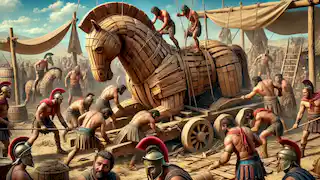
Building the Horse
The Gift to the Trojans
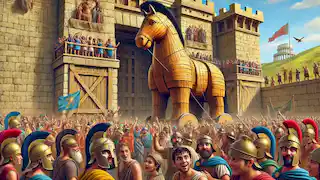
The Fall of Troy
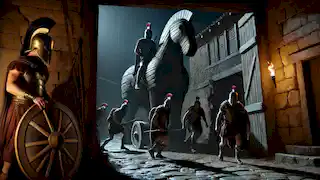
The Aftermath
Epilogue: The Legend Lives On
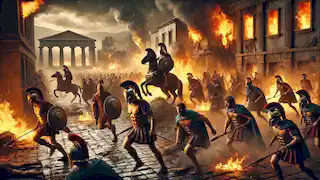
The Legend of the Wooden Horse
Reading Time: 6 min
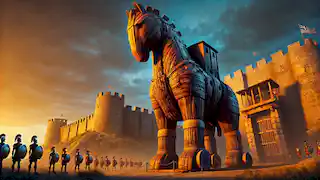
About Story: The Legend of the Wooden Horse is a Legend Stories from greece set in the Ancient Stories. This Dramatic Stories tale explores themes of Courage Stories and is suitable for All Ages Stories. It offers Cultural Stories insights. An ancient tale of cunning, bravery, and the legendary fall of Troy.

















